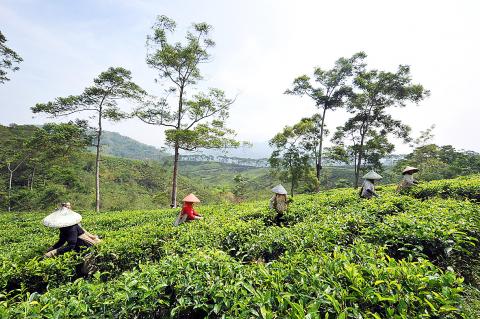British farmers are experimenting with crops such as olives and nectarines which have traditionally been imported from southern Europe, while the first British tea plantation has opened with a changing climate set to transform the nation’s countryside.
Flowers will bloom early and crops will be harvested sooner as Britain marches toward what the government describes as a “wetter and warmer” UK.
Britain’s first tea plantation has opened in Cornwall in southwest England, the country’s warmest region and the center of much of the current crop experimentation.

Photo: AFP
“We had an opportunity when temperatures in Cornwall turned warmer and we started a farm in 1999, but we had our first harvest in 2005 and our yield has improved every year,” said Jonathan Jones, commercial director at the Tregothnan Estate.
Tregothnan now grows 22 varieties of tea and is expecting a record harvest in excess of 10 tonnes this year. The estate has also been experimenting with growing edible flowers.
Mark Diacono, a farmer in neighboring Devon, has been trying to grow a wide array of crops, including olives, pecans, Szechuan pepper and apricots, and he also lists a vineyard on what he calls his “climate change farm” on his Web site.
“I just made a list of all the foods I liked, knocked out all the things others grow perfectly well locally or are cheaply available. I researched and found out that some that had not been grown here before might be possible given new varieties and climate change ... so I planted,” Diacono said.
David Leaver, professor emeritus and former principal of the Royal Agricultural College, said the potential for new crops in Britain will depend not only on the degree of global warming, but also on the extent to which plant breeders are able to develop new varieties able to withstand lower temperatures.
“Maize, for example, was not grown in this country, but is now it’s increasingly grown, mainly because of plant breeder achievements in breeding earlier maturing varieties, rather than due to global warming. This may be achievable for other crops — so climate change is not the only factor affecting cropping patterns,” Leaver said.
Robert Watson, chief scientist at the British Farming and Environment Ministry, said his department was closely monitoring the impact climate change was having on crops.
“There is no question that climate change will have significant effect on crops. Climate change might be beneficial for the UK, at least because we will have a larger growing period with shorter winters and earlier springs,” Watson said. “By 2050, the impact will largely be positive for crop growers, but that will depend on where you are in the UK.”
Watson cautioned, however, that climate change does also raise serious concerns for a country such as Britain that relies heavily on food imports.
“If we take the world as a whole, with an increase of two to three degrees the overall impact will be negative. We are 65 percent food sufficient and the rest, 35 percent, is imported, mostly from Europe,” he said. “So far, the supplies have been secure, but the question is will the international markets be a secure food source, and at the same time, with the economic growth in China and India, will they push hard for increased food supply?”

Yemen’s separatist leader has vowed to keep working for an independent state in the country’s south, in his first social media post since he disappeared earlier this month after his group briefly seized swathes of territory. Aidarous al-Zubaidi’s United Arab Emirates (UAE)-backed Southern Transitional Council (STC) forces last month captured two Yemeni provinces in an offensive that was rolled back by Saudi strikes and Riyadh’s allied forces on the ground. Al-Zubaidi then disappeared after he failed to board a flight to Riyadh for talks earlier this month, with Saudi Arabia accusing him of fleeing to Abu Dhabi, while supporters insisted he was

‘SHOCK TACTIC’: The dismissal of Yang mirrors past cases such as Jang Song-thaek, Kim’s uncle, who was executed after being accused of plotting to overthrow his nephew North Korean leader Kim Jong-un has fired his vice premier, compared him to a goat and railed against “incompetent” officials, state media reported yesterday, in a rare and very public broadside against apparatchiks at the opening of a critical factory. Vice Premier Yang Sung-ho was sacked “on the spot,” the state-run Korean Central News Agency said, in a speech in which Kim attacked “irresponsible, rude and incompetent leading officials.” “Please, comrade vice premier, resign by yourself when you can do it on your own before it is too late,” Kim reportedly said. “He is ineligible for an important duty. Put simply, it was

The Chinese Embassy in Manila yesterday said it has filed a diplomatic protest against a Philippine Coast Guard spokesman over a social media post that included cartoonish images of Chinese President Xi Jinping (習近平). Philippine Coast Guard spokesman Jay Tarriela and an embassy official had been trading barbs since last week over issues concerning the disputed South China Sea. The crucial waterway, which Beijing claims historic rights to despite an international ruling that its assertion has no legal basis, has been the site of repeated clashes between Chinese and Philippine vessels. Tarriela’s Facebook post on Wednesday included a photo of him giving a

Syrian President Ahmed al-Sharaa on Sunday announced a deal with the chief of Kurdish-led forces that includes a ceasefire, after government troops advanced across Kurdish-held areas of the country’s north and east. Syrian Kurdish leader Mazloum Abdi said he had agreed to the deal to avoid a broader war. He made the decision after deadly clashes in the Syrian city of Raqa on Sunday between Kurdish-led forces and local fighters loyal to Damascus, and fighting this month between the Kurds and government forces. The agreement would also see the Kurdish administration and forces integrate into the state after months of stalled negotiations on